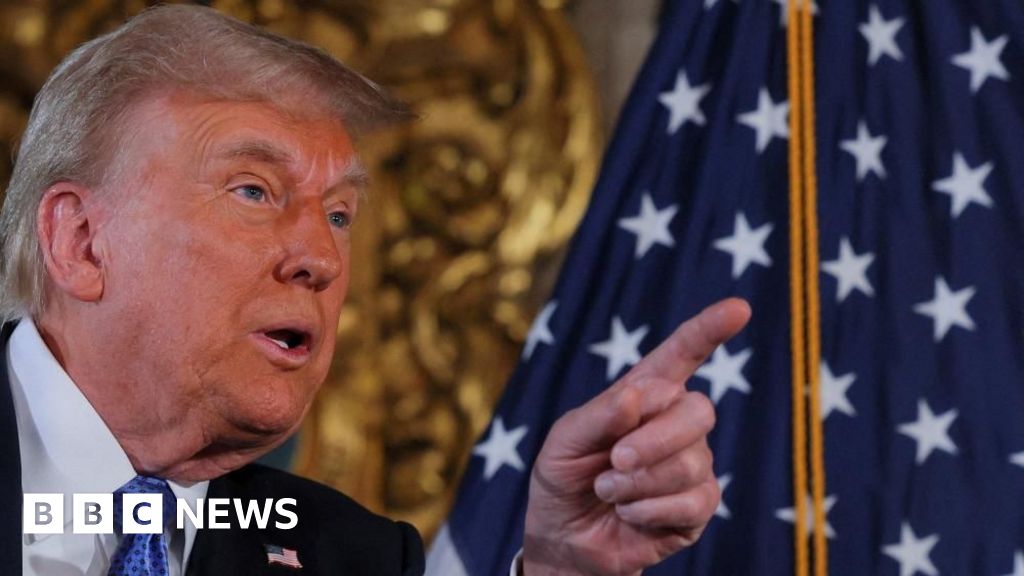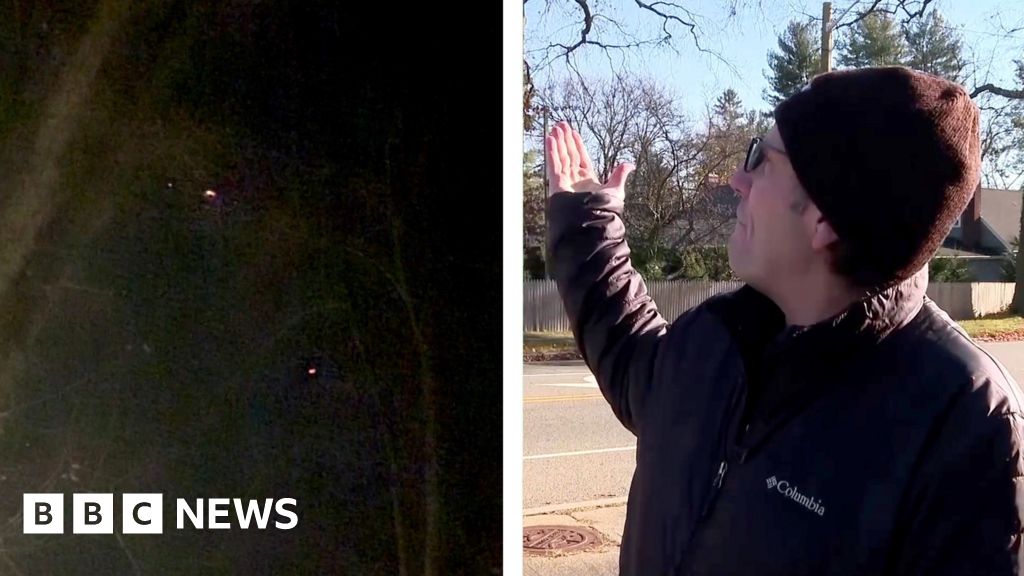ARTICLE AD BOX
By Sam Cabral
BBC News, Washington
Image source, Getty Images
Image caption, Democrat Terry McAuliffe (left) is facing Republican Glenn Youngkin (right) in the electionThere's a dead heat in the race to elect Virginia's next governor, as Democrats and Republicans tussle against the backdrop of a tense political climate.
Democrat Terry McAuliffe, 64, is betting the state's leftward trend in recent years will carry him to a second term in the governor's mansion.
He has faced a spirited challenge from businessman Glenn Youngkin, 54, a political novice who has energised Republican voters in recent weeks.
Polls suggest the two men are deadlocked and the race is a toss-up.
The contest in Richmond touches upon issues that have become political flashpoints across the US, and the results will have implications beyond Virginia. It is being seen as a proxy war for the battles ahead.
An unpopular president (and predecessor)
Image source, Getty Images
Image caption, President Joe Biden (left) has campaigned in person with Mr McAuliffe just twiceTuesday's election comes as partisan frustrations have boiled over in Virginia and across the country in recent months.
Republicans have railed against coronavirus mandates, inflation and high gas prices; many also still believe the 2020 election was stolen, while others would rather look to the future.
Meanwhile, Democrats are conflicted over the White House's policies, dampening the enthusiasm of voters.
Nationally, the leaders of each party - President Joe Biden and former President Donald Trump - face divided opinions within their own ranks.
As a result, the two candidates in Virginia are walking a tightrope that requires balancing party interests with keeping Mr Biden and Mr Trump at arms' length - a sign of their unpopularity.
The problem appears to be especially clear for Democrats at the moment.
Mr Biden won Virginia by more than 10 percentage points, but his approval rating as president has sagged to 43%, according to the FiveThirtyEight website.
Also looming large over the race will be his chaotic exit from Afghanistan in August.
Virginia is home to more than 100,000 service members, as well as the largest naval station in the world, so the military vote could play a key role in the tight race.
Scott Nolan, 57, from Reston in Fairfax County, tells the BBC that his own support for Glenn Youngkin has little to do with the pullout, but what happened in the final days of the war was emblematic of a larger issue: the end of a contract with America.
"After three generations of military service in my family, I'm not sure I could recommend service to my sons. I don't see a will on the part of the country to keep them safe anymore," says Mr Nolan, a former naval officer.
For Mr McAuliffe, a prolific Democratic fundraiser who has been involved with the party since the Clinton years, being too closely associated with the Biden administration could be a double-edged sword.
Mr Biden has been on the campaign trail twice, and Mr McAuliffe has instead leaned into an oft-repeated claim: "My opponent was endorsed five times by Donald Trump".
The ex-president is deeply unpopular and has not been visible in this race, only showing up to a virtual tele-rally.
Unlike most Republicans this year, Mr Youngkin has avoided the Trump camp's most hard-line stances, including that the 2020 election was "rigged".
The former private equity executive has instead carved out a more moderate route.
The coming education wars
In the Trump years, the vote-rich Virginia suburbs turned away from the Republican party in droves, alienated by his rhetoric and style of governance.
But that trend may be upended this year, by suburban parents, many of whom are upset with their local school districts over mask and vaccine mandates for their children, and the debate over social issues like gender and race. Schools have become the latest front in America's culture wars as disputes rage over transgender bathroom access and critical race theory.
Republicans have capitalised on the frustration, arguing that liberal dogma is taking precedence over student welfare.
The political fight has erupted into plain view in wealthy Loudoun County, northern Virginia.
Over the summer, police intervened at a raucous school board meeting attended by upset parents.
More recently, US media reported on the school board's apparent cover-up of a 15-year-old girl's sexual assault. The incident led to a walkout by hundreds of students.
At a recent campaign event, Mr Youngkin - who has leaned into parental concerns - asked: "What other tragedy awaits Virginia's children?"
Brooke Riske, 35, an independent voter from Roanoke, says she backs Mr Youngkin because he understands the importance of "leaving decisions to parents" rather than teachers or school boards.
"I'm sending my first-grade son to school every day wearing a mask," she said.
"I'm not against other kids wearing them," she said, but argued that it should be "a parent's choice", not the school's or government's.
Black voters: tired or wired?
Image source, Getty Images
Image caption, Mr Youngkin's coalition of Republican and independent voters could carry him to an upset victory on TuesdayBlack voters have been a cornerstone of the Democratic party for decades, and Democratic control of the White House and the Senate was secured on the back of strong black support.
In Virginia, African-American voters make up nearly one-fifth of the electorate.
Back in 2013, Terry McAuliffe won 90% of the black vote on his way to the highest office in the state.
But this time, that prospect looks far from certain.
Nationally, black activists have expressed disappointment that the federal government's efforts on police and voting reform have stalled.
In Virginia, some were incensed by outgoing Democratic Governor Ralph Northam, after he acknowledged he was one of two people in a 1984 school yearbook photo, one in blackface and the other in a KKK robe.
And when Mr McAuliffe jumped in to the gubernatorial race late, he quickly shut out a young and diverse field that included three black candidates.
To Keirsten Greggs, 45, it was reminiscent of the "sneak play" that saw Joe Biden nominated from the Democratic primary election field last year.
"If we're going to beat the Republicans, only one older white guy can do it," grumbled the Fairfax resident.
The McAuliffe campaign has held targeted outreach to black voters, recruiting some of the Democratic Party's most prominent voices, from Barack Obama to voting reform activist Stacey Abrams.
In video messages aired at more than 300 black churches across the state, Vice-President Kamala Harris implored attendees to vote after Sunday service.
But Ms Greggs says the race has "nothing" for her because Democrats are not talking about issues she cares about, like compensating descendants of slavery or ending qualified immunity for police officers.
It has left her feeling more disenfranchised than ever, her voice drowned out by the national conversation.
"Black women have to come to the rescue of the Democratic Party to save Virginia now, the same way that we were used in the 2020 election," she told the BBC.
"We're still in a situation where it's anything but Donald Trump. That's the big bad and you do the opposite."
A preview of the 2022 midterms
It is a well-known pattern in American politics that the party in power in Washington loses seats in midterm elections.
That means Democrats - who currently hold razor-thin majorities in the House and Senate - are in danger of losing both chambers of Congress and, by extension, the ability to enact President Biden's agenda.
In Virginia, voters delivered a referendum on Mr Trump by electing a crop of Democrats to Congress in 2017, and flipping both chambers of the state legislature from Republican to Democrat in 2019.
Since then, lawmakers have taken on several issues of national import: expanding voter access, raising the minimum wage, abolishing the death penalty and rolling back abortion restrictions.
But polls in the race indicate an enthusiasm gap, with Republican voters clearly motivated to curb the liberal laundry list.
The last time a Republican won statewide office in Virginia was 2009, so if Mr Youngkin wins, his party would hail the upset as proof of widespread opposition to the Democrats' policy agenda.

 3 years ago
42
3 years ago
42








 English (US) ·
English (US) ·